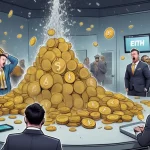DAOs Unveiled: Blockchain Governance Revolution and Its Hidden Flaws

Deep Dive into DAOs: Redefining Governance in the Blockchain Era
Frustrated by corporate opacity and gatekeepers hoarding power? Decentralized Autonomous Organizations (DAOs) are flipping the script, empowering communities to steer billion-dollar systems without a single CEO or boardroom in sight. These blockchain-based entities are rewriting the rules of collaboration, ownership, and decision-making, but they’re not without their warts. Let’s unpack the promise and pitfalls of DAOs, from their rocky origins to their potential as cornerstones of a decentralized future.
- Core Concept: DAOs are blockchain organizations run by smart contracts, enabling community voting without central control.
- Historical Lessons: The 2016 DAO hack exposed vulnerabilities, shaping today’s focus on security and governance.
- Modern Impact & Risks: Managing massive assets, DAOs face whale dominance, legal uncertainty, and coordination chaos.
1. What Are DAOs and How Do They Work?
At their core, DAOs are a radical rethink of how organizations function. Built on blockchain technology, they operate without traditional hierarchy, relying instead on smart contracts—think of them as digital vending machines that automatically execute actions like fund transfers or protocol updates once predefined conditions are met. No middlemen, no bosses, just code and community. Token holders, anyone owning the DAO’s native cryptocurrency, vote on proposals ranging from treasury allocations to software upgrades. Every decision and transaction is recorded on-chain, offering transparency that makes corporate backroom deals look like ancient history. For a deeper understanding, check out this comprehensive guide on decentralized organizations.
This setup is the backbone of Web3, a movement pushing for user ownership over centralized gatekeepers. DAOs embody decentralization by distributing power to stakeholders, often globally, in real time. But don’t be fooled—this isn’t just tech wizardry; it’s a social experiment testing whether humans can truly govern without a top-down structure. Spoiler: the jury’s still out.
2. The Birth of DAOs: A $50 Million Lesson in Pain
The story of DAOs kicks off with a spectacular failure. In 2016, “The DAO” launched on Ethereum as a groundbreaking venture fund, pulling in $150 million in Ether through one of crypto’s first major crowdfunding campaigns. The vision was bold: a decentralized investment platform where token holders collectively picked startups to back. Then disaster struck. A hacker exploited a flaw called a reentrancy attack—essentially tricking the smart contract into paying out funds repeatedly before updating its balance—and siphoned off $50 million in hours.
The fallout was seismic. Beyond the financial hit, it sparked a philosophical clash within Ethereum’s community. Should the blockchain be immutable, where “code is law” even in catastrophe, or should it adapt to protect users from human error? The majority opted for a hard fork, rolling back the chain to recover funds and birthing modern Ethereum (ETH). Purists who rejected intervention stuck with the original chain, now Ethereum Classic (ETC). The split wasn’t just technical—it exposed a lingering tension in crypto about trust, responsibility, and the ethics of decentralization that still haunts discussions today.
From the ashes came hard-earned wisdom. The DAO’s collapse forced the industry to prioritize security. Now, rigorous smart contract audits, emergency pause mechanisms to halt exploits, formal code verification, and cautious scaling—starting small before managing millions—are table stakes for any DAO worth its salt. It was a brutal baptism, but it laid the groundwork for everything that followed.
3. Modern DAOs: Powerhouses of Decentralized Finance
Today, DAOs aren’t just experiments; they’re heavyweights managing staggering wealth. Aave DAO oversees a top-tier DeFi lending protocol with billions in total value locked, where AAVE token holders set interest rates and approve new markets—recent debates on risk parameters show democracy in action, if sometimes messy. Uniswap DAO runs the largest decentralized exchange by volume, with UNI token holders voting on upgrades and contentious issues like fee structures, a hot topic as the platform balances growth and decentralization. Then there’s ENS DAO, governing the Ethereum Name Service for decentralized domain naming, sitting on a treasury exceeding $1 billion, a testament to how DAOs can rival corporate war chests.
These aren’t isolated cases. Sky, formerly MakerDAO, manages the USDS stablecoin, with SKY token holders tweaking stability fees and collateral rules to keep the peg intact. Each decision, logged transparently on-chain, offers a window into governance that traditional finance can’t match. But scale brings scrutiny—every bug or bad vote can tank markets, a pressure cooker most corporations never face publicly.
4. The Many Faces of DAOs: From NFTs to Social Clubs
DAOs aren’t a monolith; they span a dizzying array of purposes, each pushing boundaries in unique ways. Protocol DAOs like Uniswap and Sky manage decentralized apps, fine-tuning the engines of Web3. Investment DAOs, such as MetaCartel Ventures and The LAO, pool community capital to fund early-stage blockchain startups, though legal hurdles often restrict them to accredited investors—a bitter irony for “open” systems.
Asset-focused DAOs take a different tack. Collector DAOs like PleasrDAO and FlamingoDAO acquire culturally significant NFTs and digital art, blending investment with preservation. Social DAOs, think Friends with Benefits (FWB) or Developer DAO, create token-gated communities for exclusive events or collaboration, rewarding members with governance rights via tokens like CODE. Then there are Service DAOs—dOrg and RaidGuild operate as decentralized freelancer collectives, tackling Web3 projects with shared payouts. Grant DAOs, such as Gitcoin Grants and MolochDAO, fund public goods like open-source software using mechanisms like quadratic funding, where small contributions from many outweigh big donations from few, amplifying community voice.
Perhaps the wildest example is ConstitutionDAO. In 2021, over 17,000 contributors—from students to coders to crypto dreamers—united on Discord to raise $49 million in a week to bid on a rare U.S. Constitution copy at Sotheby’s. They lost to billionaire Ken Griffin, but the sheer audacity of strangers coordinating globally for a niche cause captured imaginations. Though disbanded, its $PEOPLE token lives on as a meme coin, a quirky footnote in DAO lore.
5. Roadblocks to Utopia: Why DAOs Aren’t Perfect
For all their innovation, DAOs are far from a silver bullet. Governance is a cesspool of imbalance—studies show in many major DAOs, less than 1% of members control nearly all voting power. Let’s call it what it is: a digital feudal system where “whale” token holders lord over the masses, hardly the decentralization we signed up for. Voter apathy doesn’t help; most token holders can’t be bothered to participate, often lacking the expertise or interest to weigh in on complex proposals. Turns out, even in a blockchain democracy, plenty would rather doomscroll than vote on a $1 billion treasury.
Security is another gaping wound. Smart contract bugs can still trigger catastrophic losses—one bad line of code, and millions vanish. Legal uncertainty looms like a guillotine. Are DAOs partnerships, corporations, or some alien entity? Without clear laws, a DAO could be deemed illegal overnight, leaving token holders liable for fines or worse—a nightmare for decentralized idealists. Wyoming’s DUNA Act offers some recognition, and a proposed 2025 Harmony Framework in the U.S. aims to provide structure while preserving autonomy, but global consensus is a pipe dream. And don’t get me started on coordination—when everyone has a say, decisions can stall or spiral into chaos, a far cry from the efficiency DAOs promise.
Let’s play devil’s advocate: are DAOs just a shiny toy for crypto nerds? Some argue traditional firms with defined accountability still outpace these experiments in trust and execution. When a DAO flops, who do you sue—the blockchain? It’s a fair jab in a space often blinded by optimism.
6. Bitcoin vs. DAOs: A Maximalist’s Grumble
As Bitcoin maximalists, we can’t help but raise an eyebrow at the DAO frenzy, largely driven by Ethereum’s ecosystem. Bitcoin’s beauty lies in its simplicity and ironclad security—a store of value and peer-to-peer money, not a playground for programmable experiments. DAOs need complex smart contracts and flexibility, something Bitcoin neither offers nor should. Its protocol is a rock, not a canvas, and that’s by design. Ethereum and other chains like Solana (with projects like Marinade Staked SOL) or Polkadot fill this niche, and that’s fine. The financial revolution isn’t a one-coin crusade; it’s a messy coalition where altcoins tackle use cases Bitcoin wisely sidesteps. Grumble we may, but we respect the broader battlefield.
7. What’s Next for Decentralized Governance?
The future of DAOs teeters between thrilling and treacherous. Institutional players are sniffing around, buying tokens and swaying votes, which could lend credibility but risks eroding the grassroots ethos. Hybrid models—blending DAO governance with corporate shells—are popping up to bridge mainstream adoption, though purists cry foul at any centralization creep. Legal flashpoints are inevitable; cases like the CFTC’s lawsuit against Ooki DAO for unregistered trading show regulators are itching to clamp down. How DAOs navigate this gauntlet in 2024 and beyond will define their legitimacy.
Tech could be a game-changer. AI integration, already floated for tasks like vote tallying or proposal analysis, promises efficiency—imagine on-chain analytics predicting governance outcomes. But beware: relying on centralized AI providers could sneak backdoor control into trustless systems, a poison pill for decentralization. Human oversight must remain paramount, or we’re just trading one overlord for another.
DAOs are punk rock in organizational form—raw, rebellious, and sometimes painfully out of tune. They embody the disruption, freedom, and privacy we champion, a middle finger to entrenched power. But anyone peddling them as flawless is shoveling nonsense. They’re a seismic shift, yes, but riddled with cracks. Next time you hear of a DAO raising millions, ask yourself: who really holds the reins behind those tokens? The answer might sober up even the most starry-eyed crypto believer.
Key Takeaways & Questions on DAOs
- What Are DAOs in Crypto and How Do They Operate?
DAOs, or Decentralized Autonomous Organizations, are blockchain entities run by smart contracts that automate decisions. Token holders vote on actions like funding or updates, with transparent on-chain records, no central authority required. - Why Was the 2016 DAO Hack a Defining Moment?
A $50 million theft via a smart contract exploit shattered trust and split Ethereum over immutability debates, but it forced better security practices like audits and safeguards that shape DAOs today. - What Types of DAOs Are Shaping Web3?
From Protocol DAOs like Uniswap managing exchanges to Investment, Collector, Social, Service, and Grant DAOs, they redefine niches in finance, art, community, and public goods with decentralized models. - What Are the Major Risks in DAO Governance?
Token concentration among “whales,” voter apathy, smart contract vulnerabilities, and murky legal status threaten fairness, exposing DAOs to failures, exploits, and potential regulatory crackdowns. - Can DAOs Mesh with Traditional Finance and Law?
Legal steps like Wyoming’s DUNA Act and institutional token ownership hint at integration, while hybrid DAO-corporate setups could drive mainstream acceptance without fully sacrificing decentralized roots. - Will AI Transform Decentralized Organizations?
AI could streamline governance by automating tasks like vote counting, enhancing efficiency. But without human control, reliance on centralized AI risks undermining the trustless ethos DAOs stand for.



